Posted on Tue, Dec. 26, 2006
CUBA
Rock climbing by Cubans discouraged
Rock climbing -- an extreme sport brought to Cuba by foreigners -- has begun to irk the Castro regime as an outside influence.
The Wall Street Journal
VINALES, Cuba - Seventy feet up a sheer limestone cliff known as La Cuchillita, or Little Blade, 17-year-old Roylandi González held onto a ledge by his fingertips. Then he glanced down to check the harness around his waist, grabbed hold of the rope that was tethered above him and started shimmying downward.
Over the past several years, adventurous Cuban youths like González, schooled by an influx of foreign rock climbers, have turned this western town into an extreme-sport magnet. Climbers test their mettle on dramatic crags, barely touched by man, which soar above a green valley designated as a U.N. World Heritage Site.
But climbers who have conquered Viñales' jagged peaks are now up against a more formidable obstacle: the Communist political system.
González cast a wary eye for park rangers and police.
''There's something about rock climbing that really seems to worry our government,'' he said.
As Cubans begin contemplating life after Fidel Castro, rock climbing has emerged as an improbable battleground between the government and young Cubans eager to embrace the latest foreign fashions.
PERMIT REQUIRED
In 2003, amid a broad crackdown on civil liberties and fraternizing between tourists and Cubans, the government announced that rock climbers henceforth would be required to obtain a special permit. But the government has never granted the required permit to the many climbers who have requested one.
Adrian Pérez Martínez, a 20-year-old art teacher, says that police showed up at his house recently to warn him against climbing, especially with foreigners. ''Good Cubans don't do this,'' he says they told him. ''Climbers use drugs. And you shouldn't take foreigners to militarily significant areas.'' Indeed, some caves in Viñales are designated as civil-defense sites in the event of a U.S. invasion.
Some of the official anxiety over climbing seems to be based on Cuba's revolutionary history. The revolution that brought Castro to power in 1959 was launched from a clandestine encampment in the Sierra Maestra Mountains on the eastern end of the island. ''The Revolution was the work of climbers and cavers,'' Castro is reported to have said.
Now the government may be worried that history will repeat itself. 'The system is paranoid about Cubans' private activities, but especially when those activities are occurring in hills away from sight and when foreigners are involved,'' says Vitalio Echazabal, one of the first Cubans to take up rock climbing in the 1990s. 'The authorities would ask, `Are they spies? What are they plotting up there?' ''
Echazabal got so fed up that he defected to Spain during a climbing expedition in 2001, one of three Cuban climbers who have escaped the island during international sporting events. About a half-dozen others got off the island after marrying foreigners they met on the hills.
The exodus of climbers has only served to intensify official suspicion of the sport. ''Climbers are very independent people, and the Cuban government has a real hard time with anything it cannot control -- even a form of recreation,'' says Armando Menocal, a 65-year-old Wyoming lawyer who is the leading international proponent of Cuban climbing. Menocal, who runs the Cubaclimbing.com website, has been caught in the backlash himself.
TURNED BACK
Beginning in the late 1990s, Menocal, who has family ties to Cuba, started training Cuban climbers, mapping local routes and importing donated equipment. But after about 15 climbing trips to Cuba over the past eight years, Menocal has been turned back by immigration officers at the Havana airport the last two times he tried to visit, most recently earlier this month. The authorities, he says, offered no explanation.
The 100 or so climbers remaining in Cuba would certainly welcome his return. Without official funding, Cuban climbers rely on equipment sent by Menocal or donated by tourists. José Luis Fuentes, a 20-year-old climber, says his shoes were given to him by an Italian, his rope by a Canadian and his harness by an American. ''You speak a common language with other climbers no matter where they come from,'' he says.
`CRAZY KIDS'
He isn't sure it's a language Cuba's leaders could understand. ''Older people just think we're a bunch of crazy kids,'' says Fuentes.
Climbing has attracted a special breed of Cuban youth since Menocal and some American friends used a slide show to recruit a core group of about half a dozen Cuban climbers in 1999. One Cuban went AWOL from his military unit to go on an outing with Menocal, subsequently earning two weeks in the brig.
Official eyes were watching. ''The Cubans were always being persecuted because it was not looked upon favorably to socialize with foreigners,'' says Craig Luebben, a rock-climbing guide and journalist from Colorado who has made several trips to Cuba. As the pressure increased, the Cubans and their American climbing partners would avoid appearing together publicly, arranging separate transportation to a rendezvous at the secluded climbing site, Luebben says.
Climbers say official government climbing policy has been inconsistent. A few years ago, Hollywood, a cigarette brand partly owned by the government, launched an ad campaign featuring a climber. Yet at around the same time, a visiting Menocal was called before two different government authorities and told climbing wasn't permitted.
The inconsistencies continue today. On a recent day at the park visitors center near the Viñales climbing site, there were large posters of climbers in action. Nevertheless, the park ranger on duty insisted that climbing without a permit wasn't allowed under the 2003 law. ''It's not something one should even consider,'' he said, though he had no idea how one might go about getting a permit.
The climbers are regrouping under the leadership of Alexei Suarez, a medical worker who sometimes reaches his second-story Havana apartment by scaling the wall. He has been talking with government officials, trying to better climbing's image, and he says the Cuban sports ministry has been very supportive. ''We are loyal Cubans who want to make Cuba famous for climbing champions,'' Suarez says.
Tuesday, December 26, 2006
Monday, December 04, 2006
Casa Nayi, Plaza, Havana
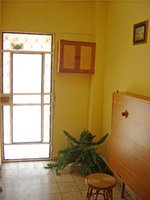
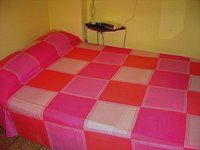
Casa particular Casa Nayi
Nayda Martin Rodriguez
No. 618 B Perfecto Lacoste
e / Maso y Emilio Nunez
Plaza de la Revolucion.
Plaza, La Habana
Phone: +53 7 878 5292
E-mail: Casa Nayi
Nayi offers you a clean, private apartment in the Plaza de la Revolucion neighbourhood of Havana.
A 1 minute walk from the bus station, 2 mins from the Plaza (the Marti Memorial, Ministry of Communication and Che Guevara mural). Very close to Estadio Latinoamericano. The neighborhood is quiet, safe and residential, but in a central location - close to Vedado, Centro Habana and Habana Vieja
The apartment has three rooms: a front room, a kitchen/eating area and a bedroom with bathroom on suite. Fully functional shower with hot water in the bathroom. The house is clean, and very secure. Bedroom has one double bed and a large dresser/cabinet for clothing. Kitchen is fully stocked with cookware, plates, utensils, etc and has a fridge/sink.
Price for complete apartment is
$ 25 - 30 CUC (Peso Cubano Convertible) per night depending on the season
Fully licensed by the government.
Casa Mercedes, Trinidad, Cuba
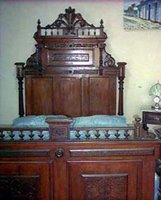

Casa particular Mercedes Albalat Milord
Calle Josè Martì no.330
entre Simòn Bolìvar y
Francisco Javier Zerquera
Trinidad, S.S. CUBA
CP 62600
Phone and fax: +53 (0)419-3350
E-mail: ico974@hotmail.com
The house is located between Viazùl pullman station and Parque Cespedes.
The casa is fully licensed with a "bed and breakfast" and a restaurant license:
The house has 3 bedrooms for rent:
- bedroom 1 : 1 bed for 2 persons, conditioned air and electric fan and 1 independent bathroom with warm water.
- bedroom 2 : 1 bed for 2 persons, conditioned air and electric fan and 1 independent bathroom with warm water.
- bedroom 3 : 3 beds for 4 persons, conditioned air and electric fan and 1 independent bathroom with warm water
All the bedrooms are in the house where all the family live, eat and sleep.
There is only one (shared) entrance to the house.
Prices: Rooms cost from 15 to 25 Peso Convertible (CUC) per night.
Meals: breakfast CUC2/3, lunch and dinner CUC 6/8.
The hosts, who are between 40 and 50 years old, are Carlos and Rebecca, a very good cook.
Ask Rebecca especially for her "langosta en salsa" and her "camarones en grille".
There is more though: you can try a lot of others exquisites dishes.
Ask Carlos for his "puerco asado" (meat) or his "pargo asado" (fish).
The rooms are cleaned on a daily basis and sheets are changed frequently.
You can have your clothes washed an ironed without any problem.
The house has also a "patio", a living room with television, video-recorder and hi-fi.
If you need a bicycle, Carlos can rent you 2 Chinese / Russian "flyers" for 2$ per day.
The house has many furnishings and objects of the colonial age and is listed in the Lonely Planet guide.
For bookings, let me help you: I call Mercedes' family about every day.
They are in daily contact with taxi drivers: for example Josè Martì Airport La Habana - Trinidad usually costs 25 CUC by taxi.
Friday, December 01, 2006
Casa Mercedes,Old Havana, Cuba
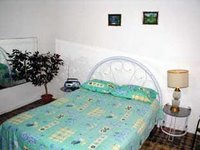
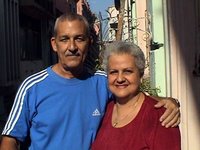
Casa particular Casa Mercedes
O'Reilly No 506, 1st floor
e/y Villegas y Monserrate
Habana Vieja.
Tel (53 7) 8634493
Email: mailto:jormer506@hotmail.com?subject=Casa%20Mercedes
Casa particular "Casa Mercedes" is a clean and welcoming "casa" (bed and breakfast) on O'Reilly, one of the main streets through Old Havana.
Their good nature and charm will make you feel at home right away. Stay in a place that takes you back in time to the days of Hemingway. A place that offers a resting place close to Cuban daily life.
Beyond the balcony of the house the real Cuba passes by. You just need to go down the stairs to not feel, but be part of that life. No other place offers you this experience.
The house in in walking distance from all the sight of Habana Vieja. La Floradita (the daiquiri place of Hemingway) is two blocks away as is the Capitolio. Hotels, bars and restaurants are close by.
The casa particular offers two clean rooms with baths opening on the patio allowing privacy.
The rooms have air-conditioning, fans, hot water 24/24.
You will sleep in all tranquility in the center of Old Havana.
The rooms are 25 - 30 Peso Convertible or it's Euro equivalent depending on the season.
Mercedes provides a great breakfast for a couple of dollars. Other meals are available as well at your request.
Subscribe to:
Posts (Atom)